Main navigation
Search Results
-
-
Dossier - 28/04/2020 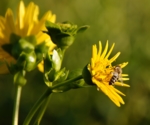
Sustainable bioenergy
Biomass from forestry and agriculture along with residues from industry and households can contribute to our energy and raw material shift. Sustainable, regenerative biomass-based energy can become part of the energy mix of the future within the framework of a bioeconomy.
https://www.biooekonomie-bw.de/en/articles/news/Sustainable-bioenergy -
Press release - 26/01/2021 Report on the Mapping of Biomass Value Chains for Improved Sustainable Energy use in the Baltic Sea Region Countries Published
The University of Warmia and Mazury in Olsztyn, Polish partner of the BalticBiomass4Value project, published a report which maps biomass value chains for improved sustainable energy use in the Baltic Sea Region countries. The research focuses on the 9 Baltic Sea Region (BSR) countries: Denmark, Germany, Estonia, Finland, Latvia, Lithuania, Poland, Sweden, and Norway.
https://www.biooekonomie-bw.de/en/articles/pm/report-mapping-biomass-value-chains-improved-sustainable-energy-use-baltic-sea-region-countries-published -
Biogas and wood as components of the energy transition - 10/02/2020 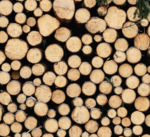
New perspectives for bioenergy
Decentralised, controllable and stable - renewable energy is an important component in the transition to a bioeconomy without fossil fuels. BIOPRO spoke to PD Dr. Andreas Lemmer from the State Institute of Agricultural Engineering and Bioenergy at the University of Hohenheim and Prof. Dr. Stefan Pelz, scientific director of the Institute for Applied Research and professorat the University of Applied Forest Sciences Rottenburg.
https://www.biooekonomie-bw.de/en/articles/news/New-perspectives-for-bioenergy -
Project BW2Pro - 29/08/2022 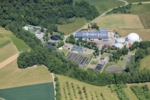
Biowaste to Products: biorefinery transforms biowaste into new products
In 2020, Germany’s population collected over 5 million tonnes of biowaste. Most of this was composted, and some was fermented into biogas. Scientists in Baden-Württemberg think there's room for more. Within the project ‘Biowaste to Products’ (BW2Pro) they want to transform biowaste into new products in a biorefinery. The idea is to produce biodegradable plant pots, mulch material, fertilisers, enzymes and biobased plastics in addition to…
https://www.biooekonomie-bw.de/en/articles/news/biowaste-products-biorefinery-transforms-biowaste-new-products -
Specialized in Sustainability - 30/09/2021 The circular economy of the future
The research project RUN (Rural Urban Nutrient Partnership) explores how waste might be used more efficiently as a resource. In this project, Veronika Fendel investigates how recyclable materials from biowaste and domestic wastewater can be fed back into the material cycle in the best possible way.
https://www.biooekonomie-bw.de/en/articles/pm/circular-economy-future -
Press release - 04/10/2021 European bioeconomy robust as bio-based industry turnover jumps to 780 billion EUR
The bio-based industries continue their ascent marking a total contribution of 780 billion EUR, a notable increase of 30 billion EUR (+ 4%) compared to 2017. This represents a more than 20% increase compared to 2008 which is the earliest data taken into account in this series of reports by nova-Institute. The first report of the series was first commissioned by the Bio-based Industries Consortium (BIC) in 2017.
https://www.biooekonomie-bw.de/en/articles/pm/european-bioeconomy-robust-bio-based-industry-turnover-jumps-780-billion-eur -
Perspectives of methane as energy source - 18/06/2020 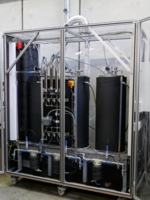
New technologies for using biogas as a balancing energy
The microorganisms in biogas plants do a great job biologically converting CO₂ and hydrogen, which are primary fermentation products, into methane. Biomethane has a great future as an energy source. Scientists at the University of Hohenheim are investigating new ways to produce and use biomethane.
https://www.biooekonomie-bw.de/en/articles/news/new-technologies-for-using-biogas-as-balancing-energy -
Dossier - 30/09/2014 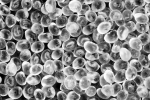
Industrial biotechnology a challenging change to the raw material base
Biogenic raw materials have never been as popular as they are now. Efforts to tap renewable carbon resources are already underway, despite the fact that new oil drilling technologies are boosting fossil fuel stockpiles. In the medium term, industry will have to expand its raw materials base, and in the long term it may have to renew it completely. Industrial biotechnology is one of the key technologies in the transition.
https://www.biooekonomie-bw.de/en/articles/dossiers/industrial-biotechnology-a-challenging-change-to-the-raw-material-base -
Article - 08/05/2019 
Environmentally friendly alternative to fossil natural gas: methane from biomass
In cooperation with the research unit of the German Technical and Scientific Association for Gas and Water (DVGW), KIT researchers have built a pilot plant in which biogas produced by fermenting residual organic materials can be upgraded to synthetic methane (synthetic SNG). Biobased methane is not only a sustainable energy source for the heating and transport sectors, but also opens up new opportunities for temporary storage of renewable…
https://www.biooekonomie-bw.de/en/articles/news/environmentally-friendly-alternative-to-fossil-natural-gas-methane-from-biomass -
-
Press release - 23/04/2021 The Amazing Field of Science: Bioeconomy to End the Ecological Crisis
Population growth and the increasing standard of living make our society face big ecological challenges: Climate change, littering of the seas, dwindling agricultural areas, resource scarcity. Bioeconomy aims at replacing fossil by regenerative resources and at using advanced and sustainable technologies based on biological knowledge and principles.
https://www.biooekonomie-bw.de/en/articles/pm/amazing-field-science-bioeconomy-end-ecological-crisis -
-
-
-
-
-
Press release - 06/04/2021 Showcase Bioeconomy: Industrial crops make unproductive farmland profitable
European project with participation of the University of Hohenheim investigates how unprofitable fields can be used sustainably while adding value with renewable raw materials.
https://www.biooekonomie-bw.de/en/articles/pm/schaufenster-biooekonomie-industriepflanzen-machen-unproduktives-ackerland-rentabel
